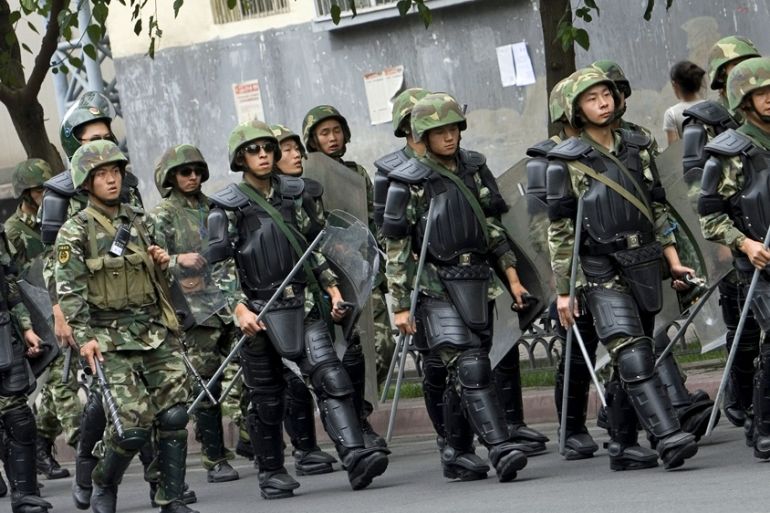Jitters in China’s Xinjiang
Era of suicide bomber arrives with deadly blasts in Urumqi. Is this also the start of urban guerrilla warfare?

A week ago, I was reporting on anti-Chinese riots that had swept through a third of Vietnam’s provinces following the sudden escalation of a long-festering territorial dispute.
Now here I was thousands of kilometres away in Urumqi, capital of Xinjiang, the sprawling province of mountains and deserts in China’s far west.
It was a little after 3am and we had flown a circuitous route from Nanning, close to the Vietnamese border, to Beijing for the connecting flight to Urumqi.
A 12-hour journey. But now it was time to work.
Less than 24 hours earlier, Urumqi had experienced its worst single act of violence since the city was convulsed by riots five years earlier, in which more than 200 Han Chinese and ethnic Muslim Uighurs had died following days of rioting.
Now 39 people were dead and more than 90 injured following a series of blasts at a busy early morning market in the centre of Urumqi.
Is this the start of urban guerrilla warfare in China, I wondered? The targeting of civilians is what happens in Iraq and Pakistan, both countries I have reported from.
But such indiscriminate violence is extremely rare here.
Sinister new pattern
In fact, until a few months ago, China could justly claim to be one of the safest countries on earth. And by and large for foreigners it still is.
However, a sinister new pattern is emerging and May 22, 2014, could prove to be a watershed moment.
No amount of security – and China’s is the tightest I know – can, of course, stop someone prepared to sacrifice their life to take out others.
The era of the suicide bomber has arrived in China. And Urumqi appears to be the front line.
Assessing how both sides of the community feel about the surge in violence is hard.
During our first full day in Urumqi, we were briefly detained by police on no less than three occasions.
The security forces are understandably nervous.
Two of the police officers who questioned us were Uighurs, presumably hired in part because of their valuable linguistic skills.
This is the kind of assimilation the government likes to promote.
Followed by police
In the Uighur neighbourhood of Mashi, I did not see one Han face. People were reluctant to talk.
There was a simple reason for this: we were being followed by police.
Off camera they would whisper clumsy warnings to people, especially Uighurs, not to talk to us.
But in their eyes, I sensed a pleading that said: “Sorry we can’t speak, but it’s too risky to tell you how we really feel right now.”
Talking to a foreign journalist during these tense times is to invite trouble, so who could blame them for ignoring my questions?
These people also worry about a possible backlash, given that most of the victims from the May 22 attack were Han Chinese.
“Nihao,” I said to one man, using the Chinese greeting for hello.
“Don’t talk to me in that language,” he growled in reply.
But many ordinary Uighurs, including possibly those who oppose China’s policies here, are just as appalled by Thursday’s attack as the Han Chinese are.
After all, who but the most warped of minds could support driving four vehicles, laden with home-made bombs, into a crowd of mostly elderly Chinese shoppers and then igniting those devices?
What makes the atrocity so chilling is that the attackers must have known who they were targeting.
Damned if you do
When it comes to its polices in Xinjiang, China must feel it is a case of being damned if you and damned if you don’t.
It has poured billions of dollars into the province, money that has been gone towards building schools, hospitals, and transport infrastructure.
From the air, modern highways crisscross the arid and sparsely populated interior.
A new subway system is under construction in Urumqi, a bustling city of four million people.
It all screams development. But there are sullen faces everywhere – and from the most unlikely of places.
A Han Chinese taxi driver we spoke to suggested the government gave Uighurs preferential treatment.
“We are only allowed one child. Uighurs can have several,” he lamented.
In fact, China now spends more money on Xinjiang than just about any other.
It is economically and strategically valuable, covering a sixth of China’s land mass and is rich in gas, oil, gold and copper.
It is where the influences of China and Central Asia overlap.
The fabled Silk Road passes through the region.
It really is the goose that has laid an awful lot of golden eggs.
Brutal challenge
None of which cuts much ice with those now brutally challenging Beijing’s rule.
They accuse the Chinese authorities of flooding the province with Han Chinese.
Xinjiang has been under Communist rule since the party took control of China in 1949.
For years, many Uighurs and other smaller Muslim minorities in the region have agitated against China’s authoritarian government.
They blame the Chinese government for what they call oppressive official policies, religious restrictions and widespread discrimination in Xinjiang.
The Chinese government has long denied any oppression of Uighurs or any other ethnic group.
But on the day I left Urumqi, a front-page story in the China Daily made for unsettling reading.
The article warned that China had now begun a one-year campaign to fight terrorism in the province which will involve “extremely tough, measures and extraordinary methods”.
We’ll know just how extraordinary in the coming weeks and months.